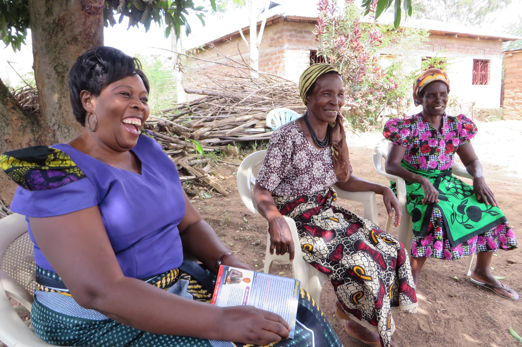Gender Equality Mainstreaming Digest – June 2018 Issue
Here are the highlights of this month’s Gender Equality Mainstreaming Digest! Click HERE for the full version.

Women’s group leaders in Nyamle, Tanzania. Photo courtesy of D. Ceplis.
Highlights:
Opportunities and Upcoming Events:
Call for Fellowships for Early Career Women Scientists now open – In partnership with UNESCO’s Organization for Women in Science for the Developing World (OWSD), the IDRC / CRDI announced the first call for applications for the new Early Career Women Scientists (ECWS) fellowships. The deadline for applications is August 31, 2018.
Empowering Women Conference – As part of the 2018 Canada’s Farm Progress Show, the Empowering Women Conference is being held on Friday June 22 in Regina, Saskatchewan.
Led by keynote speaker Barbara Stegemann, the Empowering Women Conference is for all women who want to enhance their family life, community, career and industry. This conference will provide you with the tools, inspiration and motivation to become the architect for change in achieving success, whether you are an agriculture student, a producer, a rancher, an entrepreneur or a corporate agri-business representative.
Advancing Women Conference- East – Whether you are a student studying agriculture at a university or college, producer, rancher, entrepreneur, representative of a grower association or work in corporate agri-business. Network with women from across Canada and gain insight into how you can enhance your family life and your community, fast-track your career and positively impact the agriculture industry.
October 15 & 16 2018, Niagara Falls, Ontario, with optional wine tour on October 14.
This Month’s News:
Ag Women Manitoba – A new group aims to connect more women in the agricultural community and highlight both their successes and the challenges they face in the industry.
Ag Women Manitoba, a newly created non-profit organization, held its first meeting in Winnipeg on April 5. Together, the women shared their personal experiences working in agriculture and brainstormed ideas for what they could all do as an organization going forward. With women still underrepresented in agriculture, Bailey said she and others have experienced their own set of challenges in the industry, whether it’s being the only woman at a meeting or clinic, or trying to find equipment that fits properly.
Technologies for sustainable development: mind the gender gap – New technologies are advancing sustainable development in Malawi. But these technologies must be designed to meet the needs of the group most likely to use them: women.
To achieve the ambition of gender equality as set out in SDG 5 – and interwoven through all the other goals – technology must be accessible to women. And this means technologies must be appropriate for women – i.e. designed to meet their needs. While clean cook stoves are an example of a technology that has worked well in actively improving women’s lives, other technologies are being designed in laboratories with little or no consultation with women.
One example is the treadle pump. Studies note finance barriers to accessing the pumps. The studies also highlight the physical drudgery of using the pumps. Manufacturers have revisited the design several times to make it less labour intensive and appropriate for women. This shows how the original designs had failed to consider women’s needs.
The way forward includes: Women-led designs, Outreach, awareness and education, Tailored training, Global technology discourse.
Reports Publications and Resources:
Climate Change and Gender in Canada: A Review – This research brief examines the literature on gender and climate change in Canada published since 2000, focusing on four key areas of research: food security in the North, human health, climate change attitudes and behaviors, and climate change-related employment and governance. The evidence regarding gender and food insecurity in the North is complex, but the research is clear that climate change serves as a stressor on gendered livelihood activities for both women and men in this region. Regarding climate change and health, much of the available evidence suggests that men are likely to be more vulnerable to the effects of climate change in Canada, including heat stress and infectious disease, although a growing literature on adverse pregnancy outcomes associated with natural disasters suggests that women will face unique health impacts as well. Concerning environmental attitudes and behaviors, Canadian women are generally more likely than men to perceive climate change and other environmental hazards as a threat, and are more willing to support policies to address them. However, men are more likely to undertake certain activities (such as bicycle riding) that can facilitate climate change mitigation. Although the evidence is limited, current studies are consistent that there is a gender imbalance in environmental policy and employment in Canada, with these activities predominately undertaken by men. While there has been a great deal of gender and climate change-related research published since the turn of the millennium, important knowledge gaps remain, particularly regarding the gendered effects of climate adaptation and mitigation policies, the gendered effects of natural disasters, and gender in environmental policy-making and employment.
